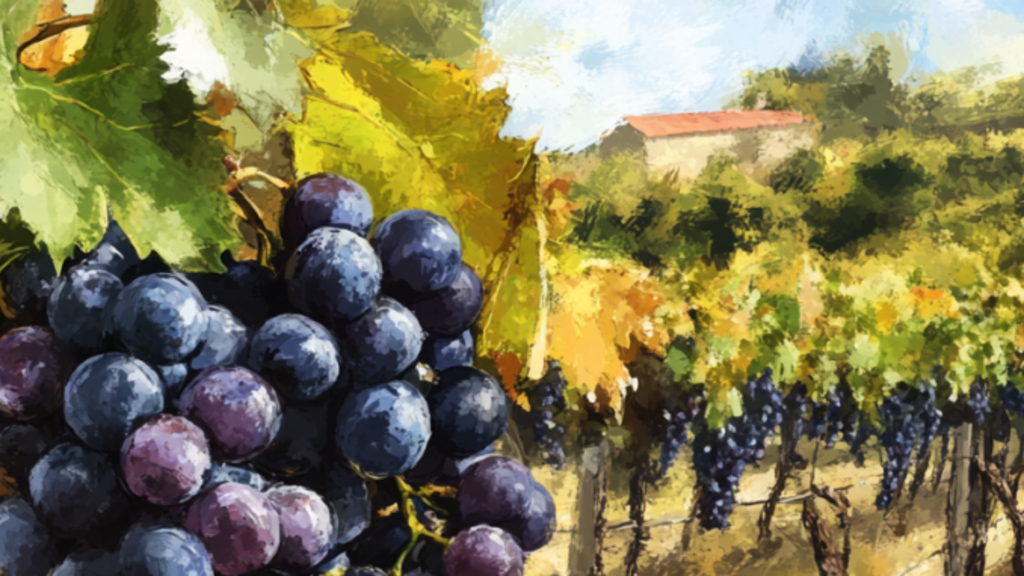Autochthonous Grape Varieties Explained
What are autochthonous grapes?

Italy is a true paradise for wine lovers, impressing not only with internationally known grape varieties but also with a wide variety of indigenous grapes – varieties that are deeply rooted in the history and culture of the country. But what exactly does "autochthonous" mean?
What does autochthonous mean?
The term "autochthonous" comes from Greek: "Autós" means "self" and "Chthón" means "earth".
Therefore, an autochthonous grape variety has independently developed in a specific location and is closely connected to the terroir of its region. It reflects the characteristics of the soil and climate, creating wines that are unique in their taste and character. One might also refer to it as a "long-established" or "grounded" variety.
What are autochthonous grape varieties?
In viticulture, "autochthonous" means that a grape variety not only grows in a specific area but also originates from that location. An autochthonous grape has been cultivated in a region for centuries and plays a central role in the wine production of that area. The term "endemic" refers only to the presence of a species in a specific area, without necessarily having its origin there.
A grape variety is considered autochthonous if it has been established in a specific region for over 200 years and is not only widespread but also culturally and economically significant. An example of this is the "Sagrantino" variety from Umbria, which has been cultivated for centuries in the Montefalco region and still plays a significant role in the local wine culture.
Therefore, Italy's autochthonous grape varieties not only provide a unique tasting experience but also offer a deep insight into the country's history and traditions.
However, there are also grape varieties that originally come from a specific region but can no longer be considered autochthonous due to their worldwide spread. Varieties like Merlot, Pinot Noir, or Riesling, although originating in countries like France or Germany, are now grown in many wine-producing regions around the world.
Why are autochthonous grape varieties so special?
Autochthonous grape varieties are known not only for their diversity and unique aromas but also for their strong connection to their respective region. They are resilient to local climatic conditions and often play an important role in the culture and history of the region. These varieties produce wines with complex, varied flavors that reflect the terroir and tradition of their place of origin.
Another advantage of autochthonous grape varieties is their sustainability: since they have adapted to their environment over long periods, they tend to require less care and are more resistant to diseases and extreme weather conditions.
Exciting autochthonous grape varieties of Italy
- Pecorino (Abruzzo and Marche): Pecorino is a white grape variety that was rediscovered only a few decades ago. It produces fresh, mineral wines with aromas of citrus, white flowers, and a hint of sage. The name comes from "pecora" (sheep), as sheep once grazed among the vineyards.
- Carricante (Sicily): On the slopes of Mount Etna grows the white grape variety Carricante, which produces elegant, mineral wines with a fresh acidity and aromas of green apples and citrus fruits. These wines reflect the volcanic terroir of Sicily and are perfect with seafood and light dishes.
In Italy, there are hundreds of officially recognized autochthonous grape varieties, each with a fascinating history and unique flavor notes.
The two autochthonous grape varieties of South Tyrol
- Lagrein:Lagrein is a powerful red grape variety that produces velvety, full-bodied wines with aromas of dark berries and chocolate. Perfectly adapted to the alpine climate of South Tyrol, Lagrein develops remarkable complexity over time. It pairs excellently with game, roast beef, or hearty dishes.
- Vernatsch:In contrast to Lagrein, Vernatsch is a light, fruity, and uncomplicated red grape variety. Once widely cultivated, its planting has now significantly declined, but the wines still continue to delight. It remains an essential part of the wine culture in South Tyrol. Vernatsch wines pair perfectly with traditional South Tyrolean dishes like Speck or a simple bread-and-cheese platter.
A Taste of History in Every Glass
Italy's autochthonous grape varieties are not only a treat for the palate but also a journey into the country's rich history and culture. These wines reflect the terroir of their regions, offering an authentic taste that is deeply intertwined with Italy's traditions and heritage. In gastronomy, it is especially important to actively explain these wines, allowing guests to better appreciate the unique significance and history behind each glass.
Cheers! 🍷